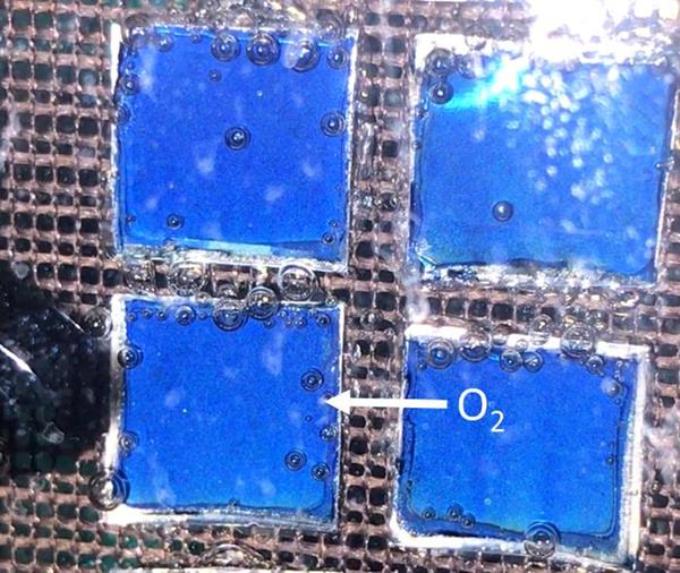Feb 22 2017
 Oxygen side. Credit: HyperSolar, Inc.
Oxygen side. Credit: HyperSolar, Inc.
HyperSolar, Inc., a company developing a breakthrough technology to make renewable hydrogen using sunlight and any source of water, has announced that it had succeeded in producing renewable hydrogen using commercially available, inexpensive silicon solar cells (provided by Midwest Optoelectronics, LLC "MWOE") protected with its proprietary coating.
HyperSolar’s researchers used a patent-pending solar-cell/membrane assembly that generates oxygen and hydrogen separately on two different parts of the solar cells.
The membrane can prevent combination of oxygen and hydrogen (hazardous gaseous mixture), which results in the extraction of “pure hydrogen” required for fuel cells that can power cars like the Honda Clarity and Toyota Mirai, as well as industrial power equipment. The integrated assembly can also prevent recombination of oxygen and hydrogen into water at the catalyst surface and greatly enhance the overall hydrogen utilization efficiency.
Additionally, the use of HyperSolar’s patent pending electroactive coating developed to protect solar cells from corrosion during extended hydrogen production is the key to this success. The successful utilization of silicon solar cells offered by outside manufacturers is another sign of the potential of HyperSolar’s technology for economically viable hydrogen production.
While the science itself is challenging, we have always looked for simple, economic, and scalable methods for hydrogen production. When fully developed, we believe our technology will be easier to deploy, and will have source-to-use energy cost competitive to the current commercial method which uses natural gas to produce hydrogen.
Dr. Joun Lee, Chief Technology Officer of HyperSolar
Currently, HyperSolar is making a 1 square foot hydrogen generator prototype using the commercially available silicon cells. Long-term stability testing of the commercially available triple junction silicon solar cells for hydrogen production is now in progress.
Our goal is to lower the cost of producing renewable hydrogen to compete with natural gas reformed hydrogen. We are very encouraged by the production levels achieved using MWOE-supplied low cost triple-junction cells. The cost of these cells, plus the catalysts necessary for hydrogen production, while not yet on par with the hydrogen produced from steam reforming of natural gas, show great promise for another method of producing hydrogen without using fossil fuels. While our ultimate goal is to complete development of our nanoparticle technology using earth-abundant materials, we are going to explore market opportunities with these readily available solar cells, that when incorporated into our proprietary prototype device, produce pure hydrogen.
Tim Young, CEO of HyperSolar.
The research carried out by HyperSolar is focused on the development of a completely renewable, inexpensive and submersible hydrogen production particle that can separate water molecules using the sun’s power, emulating the main functions of photosynthesis.
Each particle is a complete hydrogen producer that includes a unique high voltage solar cell connected to chemical catalysts by means of a proprietary encapsulation coating. A video explaining the growth of hydrogen fuel technology and HyperSolar’s full renewable process of hydrogen fuel production can be viewed at https://www.youtube.com/watch?v=9jnIFDsim9M.